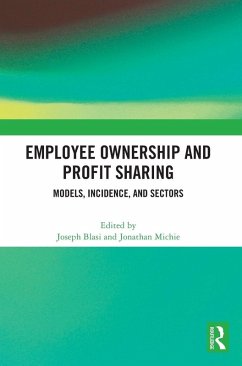This book explores a quiet revolution reshaping global capitalism: the rise of employee ownership, worker cooperatives, and profit-sharing enterprises. With 17% of US adult workers now holding equity in their companies, a new Employee Ownership Trust (EOT) being established daily in the UK, a mature sector thriving in France, extensive tax incentives in Canada, the continued development of several mature worker cooperative sectors worldwide such as Mondragon, and interest in many other nations, shared ownership is no longer a fringe idea.
Authored by leading researchers, this volume presents 16 studies on how equity and profit shares for workers operate-exploring their impact on employees' lives, firm performance, local communities, the racial wealth gap, and the determinants that drive success or failure in such enterprises. This volume is one of the first to examine the emergence of businesses that share financial results with workers as a global phenomenon; it positions this model as a significant development in postindustrial capitalism. With a strong grounding in theory, and a coherent conceptual framework to explain observed behaviors and responses of workers, managers, and firms, this volume offers evidence-based insights that should influence policy in countries around the world.
This book will be essential reading for scholars and students in economics, sociology, business, public policy, labor studies, and organizational theory, as well as for policymakers, practitioners, and advocates interested in building more equitable and resilient economies.
The chapters in this book were first published in the International Review of Applied Economics.
Authored by leading researchers, this volume presents 16 studies on how equity and profit shares for workers operate-exploring their impact on employees' lives, firm performance, local communities, the racial wealth gap, and the determinants that drive success or failure in such enterprises. This volume is one of the first to examine the emergence of businesses that share financial results with workers as a global phenomenon; it positions this model as a significant development in postindustrial capitalism. With a strong grounding in theory, and a coherent conceptual framework to explain observed behaviors and responses of workers, managers, and firms, this volume offers evidence-based insights that should influence policy in countries around the world.
This book will be essential reading for scholars and students in economics, sociology, business, public policy, labor studies, and organizational theory, as well as for policymakers, practitioners, and advocates interested in building more equitable and resilient economies.
The chapters in this book were first published in the International Review of Applied Economics.








